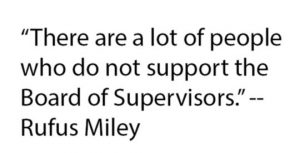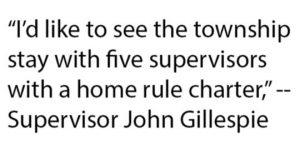The Concord Township Government Study Commission has been operating since November, and this month members finally opened up the proceedings to learn what residents want.
There has always been a public comment period during the commission’s proceedings, but commission Chairman James Gray limited the comments to agenda items and only at the beginning of the meetings, before the commissioners took up those agenda points.
For the hearing, Gray said comments would be limited to five minutes, but did allow some people to go longer and also allowed them to speak a second time after others had made their comments.

At the outset of the hearing, solicitor Michael Maddren said the commission has three options to consider. It can either recommend no change to the township government, or it can recommend one of the state’s optional plans or it can recommend that the township create its own home rule charter.
About 15 people attended the May 13 hearing, and 10 took the opportunity to make suggestions and ask questions.
Rufus Miley spoke about the options Maddren addressed, but reminded the commissioners that Supervisors’ Chairman Dominic Pileggi said the purpose of last year’s ballot question that created the commission was an attempt to counteract a citizen-led petition to change Concord from a Township of the Second Class to a Township of the First Class.
While Miley said he doesn’t think there’s any real need to change the form of township government, transparency is an issue.
“There are a lot of people who do not support the Board of Supervisors, be they Democrat or Republican. They do not agree with the way things are operated, but changing [the form of government] I don’t think will make any difference,” Miley said.
He added that if there were a change to Township of the First Class, members of the new governing body would be appointed by the Court of Common Pleas and that could result in “a better chance to have more diverse representation.”
Maddren later addressed the issue of changing to a Township of the First Class by saying that state law doesn’t allow the commission to consider that as an option.
(In a telephone interview the day after the hearing, Maddren explained that the commission, though created by referendum, was formed under the state’s Home Rule and Optional Plans Law, which constrains the commission’s recommendations and rules out suggesting a change to Township of the First Class.)
 For Anne Mueller, it’s all about restoring trust and confidence.
For Anne Mueller, it’s all about restoring trust and confidence.
“The thing I would really like from all of you is to really be able to bring back trust and confidence in the township. We’ve had a number of issues over that last two or three years that have caused a lot of division,” she said.
She added that there’s been a loss of credibility because the township overuses its consultants, specifically mentioning Pennoni Associates, an engineering firm, and land consultant Tom Comitta.
“They make too many big calls when there ought to be someone who’s on the board who really knows, technically, what they’re recommending and how to interpret that,” she said.
Mueller also said that virtually every member of the Board of Supervisors has some link to a special interest.
“I have a sense that almost everybody on the township supervisors’ board has got some tie to building or construction or sewer system or a relative or someone that is a close connection,” she said.
She said transparency would allow the residents to know what those potential conflicts of interest are.
“We need to know who the supervisors are and where they eventually have conflicts of interest so that we can move around those and not have any of our processes colored by the potential of a conflict of interest,” Mueller said.
Dan Foster, a former Democratic Party candidate for supervisor, also called for more transparency in government. Further, he suggested rotating the chairmanship of the Board of Supervisors and having regional representation on the board, something Mueller also favors.
Foster also said he would like to see a way to separate the legislative and executive functions of the supervisors.
“That’s a lot of power in one central location…because right now the Board of Supervisors can, basically and essentially, pick and choose which ordinances they want to enforce through waivers and variances,” Foster said.
He said separating executive and legislative powers would be a way to fundamentally change the structure of government.
Several other residents spoke for geographic representation, having supervisors elected by precinct, and for a shorter length of time in office. John Shoenberger said six years is too long a term for supervisor.
Virtually each of the residents said they feel the current supervisors don’t really listen to them.
Township Supervisor John Gillespie, who has attended several of the commission’s sessions, said he was disappointed with the resident turnout for the hearing. He said he thought there would have – and should have – been more people attending.
But he also reiterated a point he told the commission early on, that no matter what the commission decides, he strongly recommends keeping a five-member board to run the township government.
Gillespie said he was a township engineer for several different townships during his professional career and saw many different styles of government. However, the one thing that stood out was that a five-member panel, whether they’re called supervisors or commissioners, works best. More than that, he said, is inefficient.
“I’d like to see the township stay with five supervisors with a home rule charter,” Gillespie said. “We don’t need a police department, but possibly a constable with police authority to enforce some of our ordinances.”
The commission has until early August to make a recommendation. If the choice is to maintain Concord as a Township of the Second Class, the commission will issue a report to that effect and that will conclude its business.
If the recommendation is to accept one of the optional plans in the Home Rule and Optional Plan Law, that recommendation will go on the next ballot for the voters.
However, if adopting a home rule charter is recommended, the commission will have another nine months to draw up the charter before that is put on a ballot for voters to accept or reject.
About Rich Schwartzman
Rich Schwartzman has been reporting on events in the greater Chadds Ford area since September 2001 when he became the founding editor of The Chadds Ford Post. In April 2009 he became managing editor of ChaddsFordLive. He is also an award-winning photographer.


I have been impressed by your recent coverage of the ongoing saga in Concord Township. The decisions that are made by this township effect the entire community — not just within their own boundaries which were created a few centuries ago — but by the neighboring communities that are dealing with the excessive increase in traffic, loss of green space, and loss of the wonderful historical flavor that is so important to the entire area, because of five people’s opinions and decisions.
Thank you for paying attention to this critical issue. And thank you for for sharing the concerns of the public.